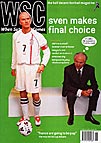 David Wangerin looks not too far back and remembers when Tony Barton's Villa were the the Kings of Europe. If only they had built upon that success
David Wangerin looks not too far back and remembers when Tony Barton's Villa were the the Kings of Europe. If only they had built upon that success
Twenty years on, it still makes for a hell of a story. English underdogs face German superstars in the final. They see their injured goalkeeper come off with the match barely under way. His substitute, with one first-team appearance to his name, proceeds to keep Rummenigge and Co at bay for 81 minutes, thanks to a combination of deft goalkeeping and a four-leafed clover he must have tucked into a sock. With 23 minutes to go, a team-mate shins in a goal, and Aston Villa hang on for dear life to lift the 1982 European Cup.
They don’t write them like that any more. Nor could they – the Champions League format has ensured that no team will again reach the final as such underdogs. More is the pity. Yet Villa’s remarkable achievement never really captured the public’s imagination the way some of us believe it should have. Did the media just not have time for a team without stars or a charismatic manager? Or was everyone too busy looking forward to the World Cup in Spain?
The club’s own attitude certainly has not helped. Until very recently there has been little official acknowledgment of the 1982 team at Villa Park, while relations between chairman Doug Ellis and the captain Dennis Mortimer have been distinctly frosty. The fact that the 1982 triumph came during a brief period when Ellis was not in control of the club is believed to be a factor. Whatever the reasons, it took more than 19 years for someone to so much as write a book about Villa’s win – not something you could see happening to Liverpool or Man Utd.
The biggest winner of all in Rotterdam was 23-year-old Nigel Spink. By the middle of the following season the substitute had become Villa’s first-choice keeper. By the end of it, he had forced the evergreen Jimmy Rimmer out to Swansea City. Spink would rack up 460 appearances at Villa before leaving for West Brom.
But what of Tony Barton, the unassuming assistant who, when Ron Saunders resigned in February 1982, stepped in and steered the team to glory? Under Barton, Villa reached the quarter-finals again the following season and came sixth in the league. They even enjoyed an unusually long FA Cup run, going out to Arsenal in the quarter-finals. But a tenth-place finish in 1984 was all it took for Barton to be dismissed. He went to Fourth Division Northampton, but was unable to last the season as the Cobblers ended one off the bottom. That spell at the County Ground seems to have marked Barton’s card. The only other managerial job he was ever given was a caretaker’s role at Portsmouth, before the appointment of Jim Smith in 1991.
Which is rather ironic. Despite his two-and-a-half years in charge, Barton was still often thought of as Villa’s caretaker manager. Yet it would be six years before the club would again finish as high as the position he left them in. Graham Turner and Billy McNeill spent the 1986-87 campaign getting Villa relegated and Graham Taylor nearly did so in 1988-89 after bringing them up the season before.
Even after his death in 1993, there has been very little overt recognition of Barton’s achievements by Aston Villa. While it is true he conquered Europe with a side Saunders built, that is to his credit – a man with a bigger ego might have tried to fix something that wasn’t broken. That Barton did not enjoy similar success elsewhere was probably due less to his own inadequacies – few would have found the transition from European champions to Fourth Division easy – than with bad timing and rotten luck. It’s a shame the man responsible for Aston Villa’s greatest achievement never got the chance to prove it.
From WSC 184 June 2002. What was happening this month